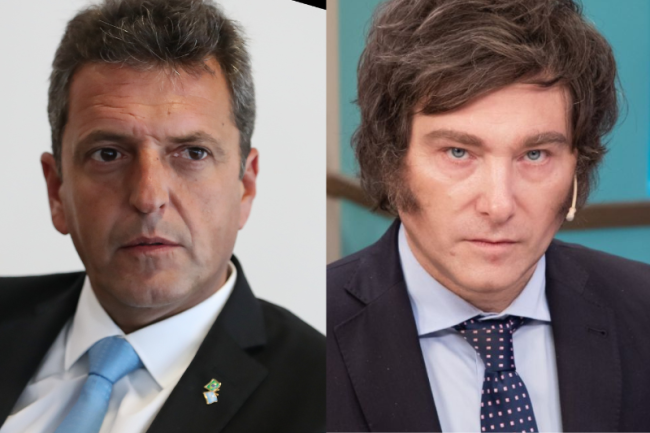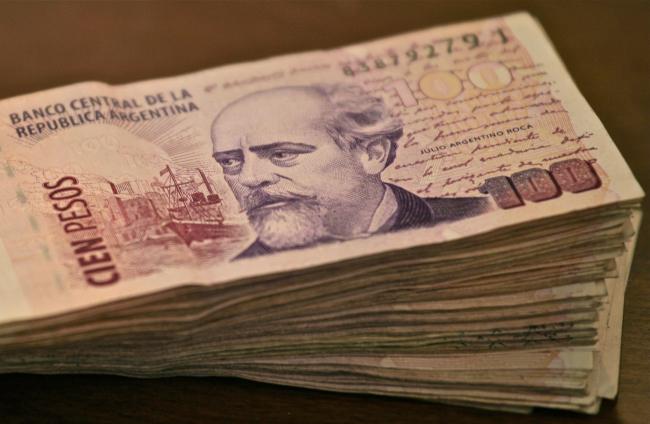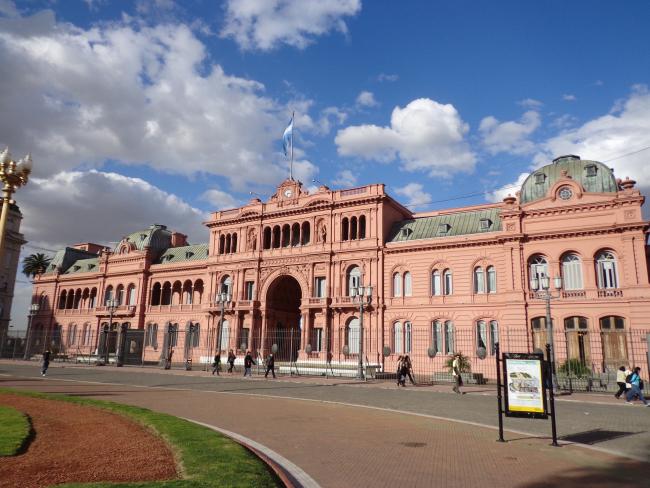
This article was originally published in Spanish on Nueva Sociedad.
Argentina activated the brakes. After an opposition wave overtook the ruling Peronist movement in the August 13 primaries and put the extreme right-wing libertarian Javier Milei at the gates of the Casa Rosada, the electorate reacted to what appeared to be a leap into the void. Between the PASO—open, simultaneous, and mandatory primaries—and the elections of October 22, the possibility of victory for the libertarian candidate set off all the alarms, allowing Peronism to recover ground and achieve the miracle it was hoping for without much conviction. Except in the case of Sergio Massa himself, a politician with an exceptional will for power.
Massa obtained an unexpected 36.6 percent; Milei, of La Libertad Avanza (LLA), stagnated at 30 percent; and Patricia Bullrich, of the center-right alliance Juntos por el Cambio (JxC), collapsed to 23.8 percent.
The fact that this result has been obtained by Massa—the economy minister of the current Peronist government, which is carrying an annual inflation rate of more than 120 percent and soaring dollar exchange rates—might seem strange. But the candidate took advantage of his position to take a series of measures, disparagingly called by some media "plan platita," which included the elimination of the income tax and several palliatives to the country’s social crisis. Additionally, in a campaign characterized by Milei's vulgar invectives and a Bullrich who, after the primary, didn’t seem to find her footing, Massa appeared as the "adult in the room." While Milei tried to chaotically form his "anarchocapitalist" utopia in a governmental project, the support for Massa ended up being a sort of defensive vote for part of society. Milei became entangled even with his most effective proposal—dollarization—and joined the worst of the "caste" he claimed to fight, such as by aligning himself with the longtime leader of the restaurant and hospitality workers’ union, Luis Barrionuevo. (Editor’s note: Barrionuevo withdrew support for Milei after Bullrich endorsed him for the second round).
Massa presented himself as presidential material and appealed to his proverbial pragmatism: he managed to contain the left-wing vote, part of which in the primaries went to the social leader Juan Grabois, and to maintain his alliance with Vice President Cristina Fernández de Kirchner. But he also became the instrument to stop Milei, especially in view of the risk that Milei might win outright in the first round. Even traditional voters of the Trotskyist left decided to "hold their noses" and vote for the economy minister.
A minister and candidate, Massa showed his political astuteness by presenting himself as someone who "grabbed the hot iron when nobody wanted to do so" and managed, in spite of everything, to "stop the explosion." In the same way, he managed to install the idea, at least in his rhetoric, that the various ills afflicting the current Argentine economy derive from the impositions of the International Monetary Fund (IMF), due to the indebtedness under the government of Mauricio Macri, and from the destabilizing attempts of the right-wing opposition.

At the same time, he managed to detach himself from Kirchnerism, showing that as president he will not act the same as he does as minister of a Peronist government made chaotic by the infighting between President Alberto Fernández and Vice President Fernández de Kirchner. Furthermore, Massa established a solid alliance with the governor of the province of Buenos Aires, Axel Kicillof, who won his reelection in a key territory for Peronism.
Massa undertook a campaign in which he positioned himself as the only politician capable of managing the Argentine state. The current minister of economy wore, in short, the suit that best fits him: that of a man of the political class capable of moving pragmatically through different spheres, including that of the establishment, and of offering dialogues in diverse directions. In the end, he is a representative of the political "caste" so reviled by Milei.
In the presidential debates, broadcast simultaneously by different television networks, Massa confronted his rivals with a discourse that highlighted the need to move toward a new political stage, without destroying the achievements of the last 40 years of democracy that will be celebrated this December. Facing the most ideologized positions of Kirchnerism, which have made a show of "confrontation with the right wing" and a permanent fascist plot, Massa used rhetoric that, in his own words, was based on avoiding "anger and hate." Facing Milei and Bullrich, he offered concrete proposals on different matters and evidenced that his will be a "centered" policy. Facing the right wing of Milei and Bullrich, he tried to appear as a sort of extreme centrist and called for a "government of national unity" with "everyone," including the center-right and libertarians.
At the same time, his campaign was based on the territorial power of Peronism which, after being surprised by Milei in the PASO vote, activated all the levers of its local power. It should not be forgotten that, for the primaries, Peronism boosted Milei in various ways in order to weaken the JxC coalition, which it considered more difficult to defeat in a second round. In the end, this strategy could work.
While Milei and Bullrich's opposition projected a strongly decadent vision of the country, Massa focused his campaign on a positive message and the idea that "we are not a shithole country." To challenge Milei, he claimed that the libertarian candidate's star proposal—dollarization—has only been applied in three countries: Zimbabwe, El Salvador, and Ecuador, the latter immersed today in a profound crisis. And to counteract attacks from Bullrich, who harshly accused him of having "doubled the inflation rate," the Peronist candidate stated that the center-right candidate's currency splitting proposal seemed to be "copied from Venezuela and Cuba," two countries that the right wing, logically, traditionally relates to Kirchnerism.
Another key aspect of Massa's campaign was the way he presented himself to society. Peronism, even progressive Peronism, presented Massa as a "normal man" in contrast to Milei's "madness." This idea of "normality" was combined with the defense of the state against the "anarchocapitalism" of Milei's law of the jungle. Massa, against all odds and despite his own role as minister, managed to make his discourse of "predictability" convincing.
After his victory in the primaries, Milei was unable to take advantage of the momentum to generate an unstoppable wave. The libertarians thought they could achieve a victory in the first round, which would require 40 percent of the vote and a 10-point lead. But, little by little, his extravagant style took its toll. His famous phrases, such as "Between the mafia and the state, I prefer the mafia. The mafia has codes, the mafia fulfills, the mafia does not lie, the mafia competes;” his positions against public education; his idea that there should be a market for human organs; and his support for the free carrying of weapons, all began to pierce his armor. The same occurred with his denialism of state terrorism during the dictatorship, which goes against the widely-held democratic consensus in the country.

Milei, however, was not only affected by his own statements—many of which were made prior to the electoral campaign—but also by those of some other members of his inner circle. For example, congressional candidate Lilia Lemoine said that her first initiative would be a law to allow men to renounce paternity, since women, with the approval of abortion in Argentina in 2020, have the "privilege of [being able] to kill their children" and renounce being mothers. And one of Milei's advisors, Alberto Benegas Lynch, proposed suspending diplomatic relations with the Vatican as long as Francis remains pope.
Some years ago, Milei himself considered the Pope as "the representative of the Evil One on Earth." "It would be necessary to inform the imbecile in Rome that envy, which is the basis of social justice, is a capital sin," he shouted on a television program. He later declared: "States are an invention of the Evil One." Although the statements were made in 2020, they went viral after his victory in the PASO primaries. A quick response came from the Catholic Church itself: a group of "curas villeros" (priests from poor neighborhoods) organized a massive mass of atonement.
In the case of an eventual Milei government, the big question is what relationship he would have with the Argentine Pope, who has not visited his country since his appointment in 2013 and said he wanted to do so in 2024. What is clear is the opinion of the Pope, who only a few days before the Argentine presidential election said without mentioning the addressee: "I am very afraid of the pied pipers... the Messiah is the only one who saved us all. The rest are all clowns of messianism." Massa announced in his post-election speech that he will seek for Francis to visit the country next year. Perhaps today Milei asks himself, like Stalin once did, how many divisions has the Pope got?
Milei's idea of the state as absolute evil sometimes took on a dark character, as when he said on television, then already a lawmaker: "The state is a pedophile in a kindergarten, with the children chained and bathed in vaseline." In fact, his psychological stability was a variable in this election. The economic elite itself distrusts him—partly because if he wins he will be a minority in Congress and does not have any serious governance teams—and the liberal magazine The Economist considers him a danger to Argentine democracy.
In this context, Jair Bolsonaro's support certainly did not bring him respectability. The libertarian candidate left no stone unturned in this election. He not only criticized “the caste,” but also confronted the mainstream media and considered several of its journalists "ensobrados" (bribed). Additionally, he mercilessly criticized Bullrich, the candidate supported by a large part of the establishment and whom he himself had praised a short time before. He called her a "murderous montonera" for her militancy in the revolutionary Peronism of the 1970s. A climate change denier and admirer of Donald Trump and the ultra-right Spanish party Vox, with a chainsaw as a campaign symbol, Milei embodies what the U.S. libertarian Jeffrey Tucker calls "brutalist libertarianism," with a project and staging that have attracted many voters (his 30 percent was unimaginable a few months ago), but has also frightened too many people, who voted to avoid his victory.
JxC will have, despite its decline in the presidential election, a large number of provincial governors. But many of them belong to the Unión Cívica Radical (UCR), a historical political force that is integrated into JxC but whose relationship with former president Mauricio Macri's party, Propuesta Republicana (PRO), has not been without tensions. With Bullrich's electoral defeat, the continuity of this coalition is open. Milei has managed to hand over the sorpasso—at least in this electoral contest—and some members of JxC could go in other directions. Will radical leaders join the "government of national unity" proposed by the Peronist candidate? The unknowns will become clearer in the coming days.
A new scenario is now unfolding: Massa will seek to take advantage of the change in expectations to give a decisive boost to his campaign; he will have to attract voters from the center and center-right, and also those of dissident Peronist Juan Schiaretti, who obtained almost 7 percent of the vote. Milei, on the other hand, will seek to attract Bullrich's votes to achieve, in his words, a "liberal revolution." After the results came in, the libertarian shifted his attacks to Kirchnerism and tacitly called Bullrich and her sector to an alliance, trying to stitch wounds. The field is wide open, although the pitch was tilted this October 22 in favor of Massa.
Mariano Schuster is Nueva Sociedad’s digital platform editor. He was editor-in-chief of the Argentine socialist publications La Vanguardia and Nueva Revista Socialista. He collaborates with media such as Letras Libres and Le Monde diplomatique, among others. He is a contributing author to ¿Tiene porvenir el socialismo? compiled by Mario Bunge and Carlos Gabetta (Eudeba, Buenos Aires, 2013).
Pablo Stefanoni is editor-in-chief of Nueva Sociedad. He is coauthor, with Martín Baña, of Todo lo que necesitás saber sobre la Revolución rusa (Paidós, 2017) and author of ¿La rebeldía se volvió de derecha? (Siglo Veintiuno, 2021).

